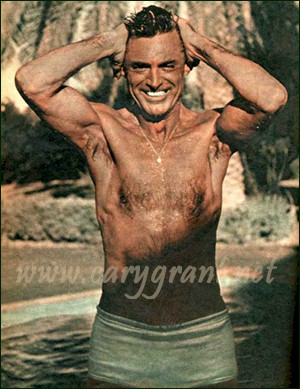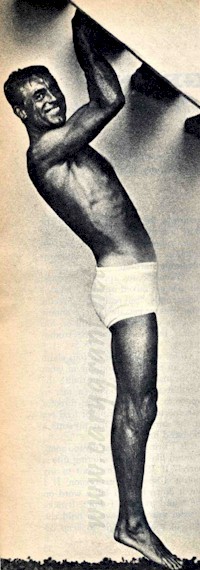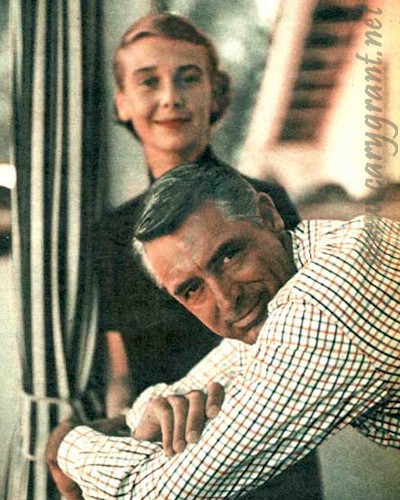|
At 53, earning
$300,000 a picture, he pooh-poohs his romantic charm
-- and calls
himself a "large, economy package of acting"

For the last 25 years,
a tall, dark, handsome and apparently ageless fellow has sauntered
through the dreams of female moviegoers. His brow and chin
are cleft sharply, as if by a sabre cut. He has spindle
shanks, a muscular torso, a perpetual tan (beach in summer, sun
lamp in winter), dazzling white teeth, and coarse iron-gray
hair. His voice is pleasantly rough, with nasal overtones;
his eyes are black, deep-set, and usually worried.
Cary Archibald
Alexander Leach Grant is able to use these physical attributes
with all the dexterity of a magician flipping a card out of the
air.
A shrug and a grin, he
is boyishly irresistible. A frown and a tightened
cheek-muscle, he is the stout adventurer. A yell and a
sprawl, he is the uproarious comedian. A whisper and a twinkle,
he is the romantic lover.
This 53-year-old actor
handles his multiple characterizations with the ease of a trained
chameleon. He refuses to believe that his personal
attraction is responsible for his ever-blooming stardom.
"Of course, sex
appeal, looks and all that get mixed up in it," he says
disarmingly, "but really, the director who hires me gets the
large, economy package of acting. I'm still on top
simply because I save the studios money."
Grant explains this
curious claim with an expert pantomime of what he means.
"suppose I'm doing the simplest thing: speaking a line to
someone off-camera. The director tells me to take a drink of
iced tea at the same time. That presents a thousand
problems.
"If I bring the
glass up too soon, I sound like a man hollering into a
barrel. If I put it in front of my mouth, I spoil my
expression. If I put it down hard, I kill a word on the
sound track; if I don't, I make it seem unreal. I have to
hold the glass at a slight angle to keep reflections out of the
lens. It has to be absolutely still to keep the ice from
tinkling since you can't use cellophane substitutes in the close-ups.
And finally, I have to remember to keep my head up because I have
a double chin!"
He points out that
using a movie novice who didn't know all this -- however
experienced an actor he might be otherwise -- could cause a delay
of hours in shooting time where each lost minute runs into
thousands of dollars.
Grant, who gets
$300,000 a picture, has been in the high tax brackets for the last
18 years. "Out of each $100,000," he says, "I
take home exactly $13,000. Even at those bargain prices I
like to work. I'm proud of being an expert screen
actor."
The kind of poise that
Grant typifies on the screen has not been easy for him to come
by. A sensitive man, inclined to be wary of the world but
desperately wanting to be friendly, he has come to the conclusion,
after more than 60 movies, that privacy is the single luxury a
movie star cannot afford.
As an actor, however,
he is anxious to have the public on his side. In the early  days of his career, he fretted away his evenings in cheap hotel
rooms, trying to analyze why people laughed or sighed at certain
words and gestures. Later, as a star, he made it a habit to
sneak into the back row at one of his own pictures and discover
firsthand exactly what bits of theatrics got a good response.
days of his career, he fretted away his evenings in cheap hotel
rooms, trying to analyze why people laughed or sighed at certain
words and gestures. Later, as a star, he made it a habit to
sneak into the back row at one of his own pictures and discover
firsthand exactly what bits of theatrics got a good response.
"I've got a whole
headful of push-button tricks," he says. "But the
best way to get the sympathy of an audience is to get yourself
into a jam and let them help you wangle your way out. A
kindly chuckle is the actor's best old-age insurance."
On the other hand,
Grant loathes the individual parts of an audience. Assailed
by autograph fans, he has been known to deliver a short,
impassioned address urging them to go back to kindergarten, then
sullenly sign his name.
He has an easily
roused temper and is capable of such great concentration that it
often appears to be an exhibition of selfishness. Grant
thinks his two marriage failures -- his first to an actress,
Virginia Cherrill, in 1934, and to Barbara Hutton, one of the
world's richest girls -- can be attributed to the fact that
"I thought too much about my career and not enough about
them."
The muscular Grant torso is made more so by chinning on a
staircase at home.
"I was
emotionally immature," Grant says humbly. "I
persisted in my stupidities." It is on such occasions
that he exhibits an unnatural gallantry toward the other sex -- a
trait which seeps through on film and endears him to all women. As
for the three-year Hutton affair, the accepted explanation is that
"the socialities around the heiress couldn't take the actors
around the husband." Whatever broke up these romances,
it did not create the usual aversion. The
rebound from the Hutton fiasco was three years behind him when he
saw a young actress-writer, Betsy Drake, playing in a London hit
show, Deep Are the Roots. Her evocative performance
impressed him. Grant
got her the lead opposite himself in his next picture. He
astounded the camera-conscious crowd by allowing her to fudge most
of the footage. They were married in Arizona on Christmas
Day, 1949, with Howard Hughes - and old friend - as best
man. The match has been a highly successful one ever since. His
pert, attractive wife - with the personality of a dedicated pixy -
has had much more influence on Grant than most people know.
She has settled him down to less drinking and practically no
smoking. She has given him a stability and comfort that he
never knew. At
their unpretentious Palm Springs house, Grant spends a good deal
of time soaking up the sun and getting his tan, exercising his
undeniably excellent physique, and chivvying his wife about her
writing - something she has been working at earnestly. He is
openly proud of her efforts in this direction. His wife
smiles mysteriously and says little, a fact that occasionally
makes her voluble and efficient husband apprehensive. The
fact is that Grant is precise and methodical enough to make him a
hard customer to live with. He does not care to have bits
and pieces lying around - everything he does, from perfectionism
in acting to dandyism in the way he dresses, fulfills this complex
of tidiness, which is possibly a reaction to the helter-skelter
commencement of his career. Though
he was born on January 18, 1904, in the respectable suburbs of
Bristol, England, in a well-to-do family, he likes to think of
himself as a cockney. He can shift effortlessly from classic
English to a spray of aspirates. He has a habit of emitting
low greetings to people high in his estimation - such as " 'Ow
are'e, Jymes?" or "Gor bless 'e, Al; 'ow's the mussus?"
This knack dates back to his first theatrical job, that of a
knockabout comedian in an English vaudeville troupe. 
Now happily wed, he says of his previous two marriages,
"I was emotionally immature."
The
group of zanies was called Bob Pender's - a rowdy collection of
impromptu violence. It featured manic stilt-walking,
eccentric dancing and slapstick comedy. Young
Archie Leach became a Penderite over his family's indignant
protests. His father, Elias Leach, was securely settled in
textile manufacturing. "I
wanted to travel and have an easy life," Grant says.
"I though acting was the easiest life possible and it would
give me a chance to travel as much as I pleased." To
avoid arguments - something which he still hates - young Leach
slipped out of the house and joined the Penders at the age of
13. A month later, his father discovered his whereabouts and
wheedled him back home. Sadly, he resumed his studies for a
year and a half at a swank academy - and then had to gratify his
itch for the theater once more. This time his family bade
him good riddance and Archie was on his way. By
1921, the fame of the Penders had spread far enough for them to
shuffle across the sea and do an act in New York. As the
eager yes-sir man of the troupe, young Leach was still soaking up
hard knocks. He was a gangling 17, on his way to
six-foot-one, with tight curly black hair, a highly ingratiating
manner, and winning ways with the girls. The next year the
Penders went back to England but Archie - enchanted with the
bustle of New York - stayed. For
two years he tried just to remain alive - shilling at sideshows,
painting neckties, even walking stilts with billboards on his back
at Coney Island. He
returned to England for two years, then was signed for a juvenile
lead in a New York musical called Golden Dawn. Archie
- as he was still known - went on to roles in Polly, Boom-Boom,
Wonderful Night and finally as the hoarsely romantic
baritone in The Street Singer. No one noticed him in
the slightest. Determined
to shed the light of his personality, he played the lead in a
dozen operettas in St. Louis Missouri, summer stock. Still
unknown, he returned to Broadway and got a job in a romp called Nikki. "I'd
been on exhibition for five years - and I felt like a squirrel in
a cage," Grant says. He announced he needed a vacation,
packed his white tie and tails, and left for the West Coast
in a second-hand car. He has never appeared on stage since. He
demonstrated his will to survive by haunting agents and casting
offices in Hollywood, living in rundown hotels and taking long
walks to dispel his pessimism. He changed his name to Cary
(from a name in a play) and Grant (found in the telephone
book). He got his first job as a javelin-tossing husband in This
is the Night, in 1932. His dark good looks and height,
plus his spontaneous manner, won him successive roles in Hot Saturday,
Merrily We Go to Hell, and Blonde Venus with Marlene
Dietrich. The first picture in which he had what he
considered a meaty part was She Done Him Wrong with Mae
West. He learned
from Miss West, he says, "nearly everything I needed" -
and this, added to the days of the Pender training, was enough to
catapult him upward. He still thinks that Miss West is the
top actress of all time. By
1940, Grant had played upper and lower parts in an estimated 30
films, nearly all for Paramount. Somewhere about that time,
he discovered he had acquired a unique gift. It was one
which few actors possess: "tickling up" a line until it
comes to life. He
found himself by quitting his Paramount contract in 1937 with an
alibi: "I was getting all the roles Gary Cooper didn't
want. I didn't feel that Gary and Cary should be
confused." Most
likely Grant wanted to resume his lone-wolf career, confident of
his ability to get along. He went over to Columbia for
$75,000 to do a picture called The Awful Truth with Irene
Dunne - that has now become a comedy classic - and went on to do Topper,
Bringing Up Baby and the first version of The
Philadelphia Story. "It's
wonderful to hear people laugh in unison," he says.
"I get more of a kick out of that than any kind of
acting."
Grant is one of the few people who can take a custard pie in the
face and not appear ridiculous. "I try to be the man in
trouble who should know better," he says. To keep
himself on top of a situation, Grant always uses a great deal of
pantomime, absorbed from his early knockabout days. He
got to do drab, serious things such as None but the Lonely
Heart and psychological melodramas like Suspicion and Notorious.
His salary went up to the top of his career in 1947 when Samuel
Goldwyn paid him his $300,000 asking price to play an
earth-visiting angle in The Bishop's Wife, and then tacked
on an extra $100,000 for additional work. At the time it
constituted an all-time salary record for a single picture. Though
it is remarkable how many movie hits of taste and quality Grant
has participated in - such as Destination Tokyo, His Girl Friday,
Dream Wife, To Catch a Thief - it is equally remarkable that he
has never won an Academy Award. At least six of the pictures
in which he has starred have brought Oscars to his co-workers, but
nothing for Grant. "There's
such a thing as doing your job too well," says one
friend. "Cary fits in so neatly on film that the
audience gets to noticing what he does rather than what he is.
This kind of anonymity is the hallmark of great talent - but it
doesn't win any awards." No
one knows how much Grant cares about recognition. Having
been on the top for 20 years, with his salary still at its
highest, he appears to be enjoying life as much as ever. He
has little time to pore over the 20 scrapbooks which constitute
his concession to ego. He
visited Spain last year and did an expert portrayal of an effete
English naval officer who gets caught up in the anti-Napoleonic
fervor of 1810. In the picture, The Pride and the Passion,
a production top-heavy with extras and costume trimmings, his role
was calculated to bring him critical applause. Coming home
from that affray, he launched himself instantly into An Affair
to Remember, with Deborah Kerr. Although
Grant allegedly despises his own face - he usually hangs his
pictures in the bathroom - his acutely aware of its cash
value. He recently hired a valet, a 33-year-old named Sam
Lewis who fought Archie Moore and lost with a close decision, on
the basis of a single sentence. :He endeared himself to me
instantly, "says Grant, "by telling me that I looked no
older than he did." "All
actors are shy," says Grant, "at least I am."
He welcomes the opportunity to put on a role he does in
disguise. "Sometimes I can get pretty tired of
myself." His alternate remedy is to seize his wife and
some suitcases and trek off to a spot where he is relatively
unknown to the natives. Though
he can safely be called middle-aged, Grant is far from losing the
enthusiasm and energy which has always characterized him.
His present despair with the modern world is that there seems to
be no more of his type of comedy. "It's the highest
from of art, to write a good comedy," he exclaims.
"People used to be able to write this kind of thing because
they had time - and because they lived with grace, they wrote with
grace." This
kind of challenge - which Grant is continually meeting - has faced
him ever since he slipped out of his bedroom window 40 years ago
on his way to join the Penders. It is very important to him
to meet life on its own terms - and triumph over it by the
exercise of gallantry and grace. "Otherwise,"
he says, "there is not much point in living at all, is
there?"
|